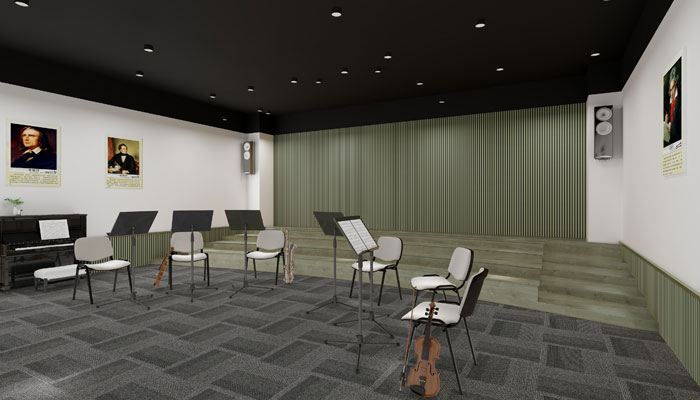
How Soundproofing Contributes to Better Acoustic Control in Your Space
In our noise-filled world, soundproofing has become more essential than ever. If you’re a homeowner looking for tranquillity, a music enthusiast seeking the perfect sound, or an office manager aiming for a more productive environment, understanding soundproofing can significantly enhance your space
How Sound Travels and Affects Different Spaces
To understand the importance of sound proofing, it’s important to know how sound travels. Sound waves move through the air and solid materials, causing vibrations that our ears interpret as noise. In open spaces, sound can bounce off walls, floors, and ceilings, creating echoes and amplifying noise levels.
Different spaces have unique acoustic challenges. For instance, homes may suffer from external noise pollution, while offices often deal with the constant hum of conversations and equipment. Music studios need precise sound control to ensure clear recordings and practice sessions. Knowing how sound behaves helps in designing effective soundproofing solutions tailored to each environment.
Benefits of Soundproofing in Homes, Offices, and Studios
Soundproofing has numerous benefits, making it a sound investment for any space. Here are some ways soundproofing contributes to better acoustic control in different settings:
Homes
Soundproofing your home can transform your living experience. It minimises noise pollution from traffic, neighbours, and household activities. This creates a peaceful environment perfect for relaxation, sleep, and concentration. Additionally, soundproofing can increase property value by making homes more appealing to potential buyers.
Offices
Soundproofing can significantly boost productivity in an office setting. By reducing background noise, employees find it easier to focus on tasks, leading to higher efficiency. Improved acoustics also enhance privacy, which is essential during confidential meetings or phone calls. This creates a more professional and comfortable working atmosphere.
Music Studios
For music enthusiasts, soundproofing is indispensable. It ensures that external noise doesn’t interfere with recordings and that sound within the studio remains clear and precise. Soundproofing also prevents noise from escaping the studio, allowing musicians to practise freely without disturbing others. This is crucial for achieving high-quality audio production.
Common Soundproofing Materials and Their Effectiveness
There is no one-size-fits-all solution when it comes to soundproofing. The material and technique used depend on the type of noise, the structure of the space, and personal preferences. Here are some common materials used in soundproofing and their effectiveness:
Acoustic Panels
Acoustic panels are popular for reducing echoes and absorbing sound. Made from foam or fabric-wrapped materials, they are easy to install on walls and ceilings. They are highly effective in improving sound clarity within a room.
Mass-Loaded Vinyl (MLV)
Mass-loaded vinyl is a dense material used to add mass to walls, floors, and ceilings. It effectively blocks sound transmission and is ideal for reducing noise from adjoining rooms. MLV is flexible and can be cut to fit various spaces, making it a versatile soundproofing option.
Soundproof Curtains
Soundproof curtains are a practical solution for windows and doors. Made from thick, heavy fabrics, they absorb sound and block external noise. They are easy to install and can also improve thermal insulation, adding an extra layer of comfort to your space.
Insulation
Adding insulation to walls, floors, and ceilings can significantly reduce sound transmission. Materials like fibreglass and cellulose are effective in trapping sound waves and preventing them from travelling through structures. Insulation is commonly used in combination with other soundproofing materials for optimal results.
DIY Soundproofing Tips for Beginners
Soundproofing your space doesn’t have to be a daunting and expensive task. Here are some DIY tips for beginners:
Seal Gaps and Cracks
One of the simplest ways to start soundproofing is by sealing gaps and cracks in walls, windows, and doors. Use weather stripping, caulk, or acoustic sealant to close any openings where sound can travel through.
Rearrange Furniture
Strategically placing furniture can help absorb and block sound. Bookshelves, rugs, and heavy curtains can all contribute to reducing noise levels. Consider adding soft furnishings like cushions and throws to further dampen sound.
Use Rugs and Carpets
Hard floors can amplify sound, so covering them with rugs or carpets can make a significant difference. These textiles absorb noise and reduce echoes, making your space quieter and more comfortable.
Install Door Sweeps
Gaps under doors can allow sound to pass through easily. Installing door sweeps is an effective way to seal these gaps and prevent noise from entering or leaving a room.
When to Call in Professional Soundproofing Services
While DIY soundproofing can be effective, there are times when professional services are necessary. If you’re dealing with severe noise issues, or if your space requires specialised soundproofing solutions, it’s best to consult experts. Professionals can assess your needs, recommend the most suitable materials and techniques, and ensure proper installation for maximum effectiveness.
Conclusion
Soundproofing is an invaluable investment for anyone looking to enhance their acoustic environment.
If you’re a homeowner seeking peace, an office manager aiming to boost productivity, or a music enthusiast striving for exceptional sound quality, soundproofing can make a world of difference. Start with simple DIY tips, and don’t hesitate to seek professional help when needed. Transform your space into a haven of tranquillity and enjoy the benefits of superior acoustic control.
